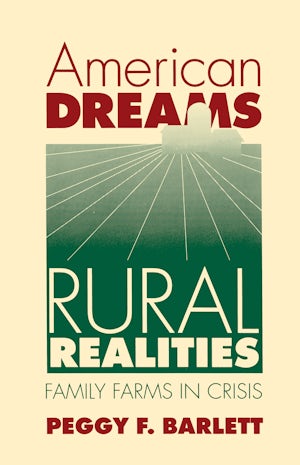American Dreams, Rural Realities
Family Farms in Crisis
By Peggy F. Barlett

320 pp., 6.125 x 9.25
-
Paperback ISBN: 978-0-8078-4399-4
Published: February 1993
Studies in Rural Culture
Buy this Book
Awards & distinctions
1995 James Mooney Award, Southern Anthropological Society
"This book is of value not only to students of agriculture and rural sociology but also to city dwellers attempting to understand the lure and frustration of family farming."--Choice
"An excellent, well-written study that substantially expands our understanding of connections between the micro level of households and the macro level of cultural trends."--American Journal of Sociology
Reviews
"This book is of value not only to students of agriculture and rural sociology but also to city dwellers attempting to understand the lure and frustration of family farming."--Choice
"An excellent, well-written study that substantially expands our understanding of connections between the micro level of households and the macro level of cultural trends."--American Journal of Sociology
"The 'great farm crisis' of the 1980s finally has a worthy chronicler in Peggy Barlett. During the worst economic decline since the Great Depression, she discovers that a third of all full-time farm operations in her study had failed over a period of five years. Why did these farms lose out while others survived and even flourished? What were the human consequences of such heavy losses? By answering these questions with surprising findings, Barlett enlarges our understanding of the clash between American dreams and harsh realities in American communities, urban as well as rural. This is a book for our time."--Glen H. Elder, Jr., University of North Carolina at Chapel Hill
"An important contribution to our understanding of how managerial orientation, generational factors, and orientation toward farming influence the survival of family farms during a period of crisis. Her evidence sheds new light on how family farms survive in market economies. The book will be considered the definitive word on the social and economic dynamics of the farm crisis in the 1980s."--Gary P. Green, University of Georgia



